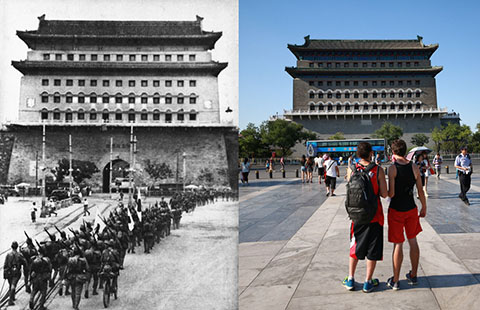New Development Bank launched in Ufa
Updated: 2015-07-10 07:49
By Zhao Yinan(China Daily)
|
||||||||
The Russian city of Ufa witnessed the launch of the New Development Bank on Thursday, a joint initiative by Brazil, Russia, India, China and South Africa, and part of China's efforts to build a multinational financial network.
So far China has joined, or proposed to establish, at least four new international financial institutions - the bank of the BRICS bloc; the $40 billion Silk Road Fund; the Asian Infrastructure Investment Bank; and a proposed Development Bank of the Shanghai Cooperation Organisation.
Chen Fengying, director of the World Economy Institute at the China Institutes of Contemporary International Relations, said these financial institutions could further lift China's outbound investment, facilitate economic integration through Beijing's Belt and Road Initiative and promote the use of the renminbi on the global market.
Chen said the new financial institutions share similar missions. "All of them aim to finance infrastructure construction projects to help with local industrial upgrading and urbanization, but they differ in the targeted market."
Chen said the potential market of the New Development Bank will be huge because BRICS states account for a fifth of the world's economic output and 40 percent of its population. Also the new bank's objective to provide relatively long-term loans for strategic profitable projects better fits the need of most developing markets.
Russian Finance Minister Anton Siluanov said on Tuesday that the long-planned development bank aims at financing projects mainly in member countries, and it will select its first projects to finance by the end of the year, according to a report in The Wall Street Journal.
Tang Min, former Asian Development Bank chief economist, said the establishment of the New Development Bank is a milestone move because it is an alternative to the IMF and a platform for the bloc countries to take part in global financial and economic governance.
"Although these projects will be funded with US dollars instead of renminbi, the New Development Bank and other new financial institutions can increase China's influence and say in global economic affairs and speed up the internationalization of the renminbi," Tang said.
Representatives of 57 prospective founding countries of the AIIB met in Beijing last week to sign the constitution of the bank, creating a legal framework for the existence of the entity and laying out the bank's objectives, membership, stakes, voting power and other vital issues.
Tang said the AIIB and the Silk Road Fund, which will become a major lender for both Asia and countries along the Silk Road Economic Belt and the 21st Century Maritime Silk Road, will facilitate trade and investment between China and these countries and the opening of a Chinese capital account.
Tu Yonghong, a finance professor at Renmin University of China, said China's efforts to take on more responsibility in the world's financial system will not necessarily lead to a more influential role for its currency.
She said the ending of the US quantitative easing policy has triggered turbulence in emerging markets, where exchange rates have fluctuated.
Tu said the AIIB could gain an advantage with its pledge to build a more streamlined structure than other international financial institutions.
The New Development Bank has also been established according to the needs of developing countries with a set of new procedures and mechanisms that have overcome the shortcomings of the IMF and will ensure the financial security of the bloc countries.
"These financial institutions will not necessarily result in a stronger presence of the renminbi on the global stage, but they will facilitate outbound investment," she said.
zhaoyinan@chinadaily.com.cn
(China Daily 07/10/2015 page3)

(China Daily USA 07/10/2015 page3)

 24-year-old ethnic Chinese girl runs for US Congress
24-year-old ethnic Chinese girl runs for US Congress
 Plane makes emergency landing after fire
Plane makes emergency landing after fire
 Ten photos you don' wanna miss - July 8
Ten photos you don' wanna miss - July 8
 Female robot sings in Shanghai
Female robot sings in Shanghai
 Stunning images of Tibetan Buddhist pilgrims
Stunning images of Tibetan Buddhist pilgrims
 Then and Now: Beijing’s historic sites as witnesses of war
Then and Now: Beijing’s historic sites as witnesses of war
 In photos: China from above
In photos: China from above
 Serena Williams beats sister Venus to reach last eight
Serena Williams beats sister Venus to reach last eight
Most Viewed
Editor's Picks

|

|

|

|

|

|
Today's Top News
New Development Bank launched in Ufa
IMF keeps 6.8% China growth view
Leaders agree on partnership blueprint
Leaders agree on partnership blueprint
More tariffs on Chinese solar panels
Students study depression to raise suicide awareness
Official denial raises doubts over '40-year-old meat' story
Yuan hit by turmoil in the market
US Weekly

|

|






